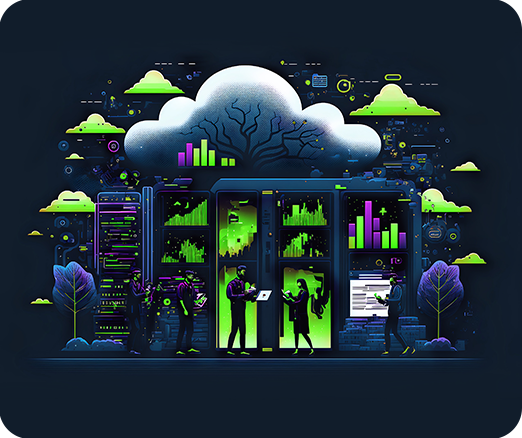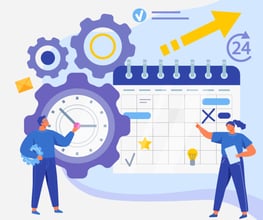
When it comes to running a successful and profitable business, it’s never a good idea to have your head in the clouds. But it is a great idea to have your data and software solutions there.
Cloud computing or cloud-based software isn’t something new—it’s been around for nearly 20 years. However, many companies, for a myriad of reasons, remain hesitant to move their data, applications, and operations to the cloud.
And believe it or not, a large number of companies continue to use outdated, inefficient legacy systems and IT infrastructures and employ software or hardware solutions that don’t operate at optimum capacity nor provide maximum security. As a result, they’re unable to gather, unify, access, and leverage near real-time retail data, reporting, and analytics to garner necessary insights to make critical business decisions that move their business forward.
But, despite the fears, more and more consumer packaged goods companies (CPGs) are adopting cloud technology—and they should. There are numerous benefits for a CPG (and its retailer partners) to implement cloud-computing solutions, including improved productivity, cost and time savings, operational efficiencies, and improved collaboration, to name a few.
Big data is only going to get bigger and bigger, and along with its rapid growth will come increased difficulty and costs for CPGs to store all their vital data and keep all their essential programs and systems up and running on in-house servers. Cloud services can help solve these problems while helping companies become more agile, cost-efficient, innovative, and profitable.
Regardless of company size, here are 8 key benefits CPGs can realize by using cloud-based software that aren’t possible with on-premises IT infrastructure:
1. Improved Mobility and Agility
In-office, remote, on-the-go, or hybrid work—CPG company employees today are working wherever, sometimes whenever, and however they are most productive—and that includes not only salespeople and field teams. This flexible work model increases the necessity for staff to stay regularly connected to, and up to date with, their coworkers and customers. Cloud-based software allows secure, mobile, and anytime access to data, files, documents, reports, and analytics via smartphones, tablets, and laptops to ensure everyone stays in the loop, wherever they may be located.
For individuals and teams to work effectively and be most productive, they need quick and easy access to essential information. Having convenient access to near real-time retail point-of-sale (POS) and inventory data facilitates faster and more-informed decision-making that can streamline supply chain operations, improve retailer relationships, and increase sales and profitability. As a bonus, it helps employees maintain a proper work-life balance.
2. Reduced Costs and Cost-effectiveness
Although an initial financial investment is required to implement a cloud strategy, and companies often fret over that cost, there is much more to consider—namely, ROI and long-term cost savings. Employing cloud-based computing offers a seamless, affordable way to manage your IT infrastructure needs without having to invest heavily in hardware or software and setting up and maintaining local servers and on-site data centers.
With cloud software, you’ll reduce your capital expenditures because your provider will bear the cost for servers, connectivity, and hardware upgrades. Also, you’ll eliminate the need and associated costs for new or additional servers now and in the future. Even your electric bill will benefit because you won’t need 24-7 electricity for power and cooling.
And those local servers and other equipment don’t maintain themselves. There are operational expenses such as ongoing server support and maintenance and the IT personnel needed to manage your systems and infrastructure.
Time is money and with faster and easier access to data, companies can save time with project startups, new product launches, and trade promotions, which makes the cloud a smart, cost-effective option. No matter what cost is reduced or saved, CPGs can choose to reinvest those savings into profit-generating activities and operational efficiencies.
3. Increased Collaboration and Remote Collaboration
Sending files or reports back and forth is time-consuming and inefficient—and it also increases the risk of someone using the wrong information or data that’s not up to date. A cloud environment allows companies to access timely data and applications remotely and provides easy editing and data-sharing options that increase collaboration and the effectiveness of collaborative efforts.
An additional benefit of cloud computing is that it provides a simple process for managers and team leaders to effectively manage individuals and teams remotely.
4. Improved Data Security
Many companies have cold feet about adopting cloud-based systems and software. They fear if their data and files aren’t kept securely on-site, they might not be protected and would be accessible to cybercriminals.
Security issues like hacking; internal data theft, which happens way more than people think; and unauthorized access are certainly real, but data security lies at the core of the cloud. Cloud systems safeguard your data and protect your applications, infrastructure, and most sensitive information from potential thefts, and they are more efficient than in-house systems and processes.
Cloud-based software ensures a high level of data security by various methods, including using encryptions when transmitting data over networks and storing it in databases, following IT security guidelines, and enabling single sign-on and role-based access so each user has access to data according to their scope of work.
5. Ease of Scalability
A significant benefit of cloud computing services is the ability to scale elastically—that is, delivering the right amount of IT resources: more or less computing power, storage, and bandwidth when they’re needed. If your company expands, you can add additional cloud services or expand your current options to match your business's newest needs, which is much easier and faster than trying to scale up or down on-premises systems and resources.
6. Data Quality Control and Greater Insights
Poor data quality—whether inaccurate, incomplete, or even latent—can result from data being stored in multiple locations and in various formats. Poor data quality results in inconsistent reporting and faulty insights, which can be crushing to the success of a CPG.
In a cloud-based environment, you store all your data in one location and in one format. No matter who accesses the information, you can maintain consistency in the data, avoid human manipulation or error, and have an accurate record of any revisions or updates made by anyone at anytime. You also eliminate individuals accidentally saving different or multiple versions of documents, files, or reports, which leads to questions, confusion, and disputes about the data.
In today’s retail world, which is becoming increasingly more digital, actionable insights play a critical role in making informed business decisions. Cloud-based applications allow CPGs to unify point-of-sale, inventory, ERP, and third-party data across teams, divisions, business units, and locations so they have one reliable source of retail data.
Companies can use cloud services to generate accurate, timely, customized reports for various retail data analytics and identify valuable insights to make data-driven decisions that result in increased efficiencies and meet the CPG’s sales, revenue, and profitability goals. The in-depth reporting and meaningful insights can help CPGs make faster, more impactful decisions and gain a competitive advantage.
7. Disaster Recovery, Data Backup, and Loss Prevention
Unfortunately, there is no way for a business to anticipate or prevent a disaster that can result in downtime or lost data. And even the smallest, unexpected complication can have significant negative effects for a CPG and its retailer partners, including lost productivity, sales, revenue, and brand reputation and loyalty.
However, companies can minimize the amount and severity of downtime and better control data loss by using cloud-based solutions. Whether there’s a natural disaster, office building fire, or power outage, cloud-based services provide secure, off-site data backup and quick data recovery.
If your business isn’t on the cloud, individuals are also at risk of permanently losing valuable data and information that is stored locally on office computers and on laptops of remote employees. Data loss could happen for any number of reasons: viral infections, lost or stolen laptops, hardware, and more. With cloud-based servers and applications, all your data is stored in the cloud, where it is safe, secure, and easily accessible from any device with an internet connection.
8. Automatic Software Updates and Increased Productivity
CPG sales, marketing, and supply chain teams rely on the most recent retail data and analytics to make quick, strategic business decisions to mitigate inventory risks and capitalize on sales opportunities. If users must wait for lengthy, manual, company-wide software updates to be installed, the downtime could result in decreased productivity, missed revenue opportunities, and plenty of unhappy employees.
Cloud-based applications automatically refresh and update, relieving IT personnel from performing time-consuming manual updates. Not only does this save valuable IT staff time and possibly money spent on outside IT services or consultation, but it also allows IT teams to spend more time on optimizing and innovating. Would you rather have your employees dedicate numerous hours to hardware setup, routine maintenance, and patching tasks or have them focus on strategic initiatives and responsibilities that help you achieve important business goals and grow your bottom line?
With reduced network latencies, business teams can maintain timely access to the most critical information that drives optimal decision-making and profitable business growth.
CONCLUSION
Moving to the cloud can be a major shift from the traditional way companies think about and utilize their IT resources, data storage, and systems—but it can be a transformative one.
There has never been a better time for CPGs to embrace cloud technology and reap its multitude of business advantages. Those who still prefer to store vital data, including POS and inventory data, and run retail analytics and business intelligence applications on local servers and networks will find themselves sooner or later at a great disadvantage when competing with brands who have the benefits of cloud computing.
Cloud-based software, such as Retail Velocity’s VELOCITY® solution, provides CPGs with a reliable, scalable, and secure platform to collect, clean, and harmonize massive amounts of daily POS, inventory, ERP, and syndicated data. With near real-time, precise, and unified data, CPG sales, marketing, and supply chain teams can generate in-depth reports and actionable insights that drive operational efficiencies, strengthen retailer relationships, and increase their overall profit margins.
Consumer behavior and market demands will continue to change and be unpredictable, but with your business in the cloud, you’ll have the flexibility and agility to prepare for and meet those demands and outmaneuver your competition.
Contact us today to learn how cloud-based retail data analytics can help you run your business more efficiently, intelligently, and profitably.



